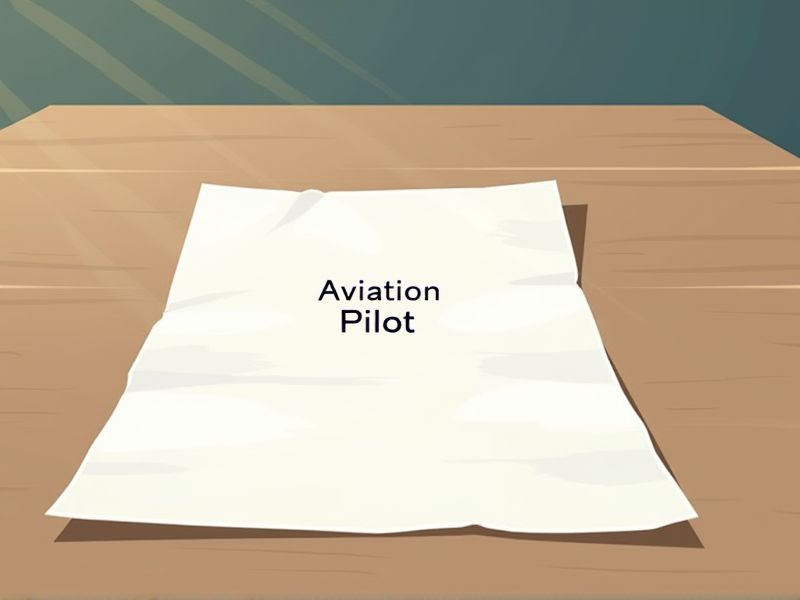
Pilots require certain certifications to ensure they possess the necessary skills and knowledge to operate aircraft safely. These certifications contribute to standardizing procedures, which reduces the risk of accidents caused by human error. Regulatory bodies mandate specific credentials to maintain airspace safety and instill public confidence in air travel. Key certifications essential for an aviation pilot include the Private Pilot License, Commercial Pilot License, and Instrument Rating.
Private Pilot License (PPL)
Obtaining a Private Pilot License (PPL) serves as the foundational stepping stone for aspiring aviation pilots by providing essential knowledge in navigation and flight operations. The PPL ensures pilots understand crucial safety protocols, reducing accident risks. Employers and advanced training programs often require the PPL as a prerequisite, verifying fundamental competencies. This license also allows pilots to log flying hours, a critical component for pursuing more advanced certifications.
Instrument Rating (IR)
Without an Instrument Rating, pilots may face limitations in flying during conditions of low visibility, such as clouds, fog, or rain, which frequently occur. The rating ensures a pilot is skilled in using aircraft instrument systems, vital for navigating safely through adverse weather. It enhances a pilot's ability to fly in controlled airspace, as many regions require this certification for flight over specific altitudes and distances. Because airlines and commercial aviation companies require pilots to have an IR, it broadens career prospects in the aviation industry.
Commercial Pilot License (CPL)
A Commercial Pilot License (CPL) allows a pilot to legally earn a living by flying aircraft. Without a CPL, pilots are restricted to non-commercial flying and cannot transport passengers or cargo for compensation. The license ensures the pilot has undergone rigorous training and possesses the necessary skills to handle varying flight situations safely. Airlines and commercial operators require pilots to hold a CPL to comply with international aviation regulations.
Multi-Engine Rating (MER)
A Multi-Engine Rating is necessary for pilots to operate aircraft with multiple engines. This rating enhances a pilot's skills in managing complex systems and handling potential engine failures. It enables pilots to expand their career opportunities, as many commercial and charter operations require competence in flying multi-engine planes. The increased speed and performance capabilities of multi-engine aircraft contribute to the demand for this certification among professional pilots.
Airline Transport Pilot License (ATPL)
The Airline Transport Pilot License (ATPL) provides a comprehensive validation of a pilot's ability to operate complex and large aircraft, which is a primary requirement for most commercial airlines. Holding an ATPL ensures the pilot has met rigorous standards of flight experience and knowledge, enhancing passenger and crew safety. Achieving an ATPL qualifies individuals to serve as a captain on multi-crew aircraft, a position necessitated by industry demand for experienced leadership. Regulatory compliance across international aviation authorities mandates an ATPL for those seeking to engage in high-level commercial flying.
Type Rating Certification
Type Rating Certification is required to ensure that a pilot possesses the necessary skills and knowledge specific to a particular aircraft model. Different aircraft have unique systems and handling characteristics, necessitating specialized training. Airlines and regulatory authorities mandate this certification to maintain safety standards and compliance. Without type rating, a pilot cannot legally operate a specific aircraft model, limiting operational capabilities.
Flight Instructor Certification
Having a Flight Instructor Certification significantly enhances an aviation pilot's ability to teach and guide new pilots effectively. This certification indicates that the pilot possesses not only technical flying skills but also an in-depth understanding of curriculum development and student assessment. It contributes to standardized training practices, ensuring consistent safety protocols are communicated and adhered to within the aviation industry. The certification process also fosters continual learning and skill improvement, maintaining a high standard of quality in aviation education and practice.
First-Class Medical Certificate
Pilots need a First-Class Medical Certificate to ensure they meet the health and fitness standards required for safe operation of aircraft. This certificate verifies a pilot's vision, hearing, cardiovascular, mental, and neurological health, minimizing risks of in-flight medical emergencies. Failure to meet these stringent medical standards directly affects a pilot's ability to maintain their license and privileges. Aviation authorities use these certificates as a regulatory tool to sustain high safety standards in the industry.
Crew Resource Management (CRM) Certification
Crew Resource Management (CRM) certification is essential as it enhances communication and teamwork skills among aviation pilots, reducing the likelihood of human error. Improved situational awareness through CRM training enables pilots to anticipate and effectively respond to potential problems. CRM certification fosters a culture of safety by promoting mutual respect and collaborative decision-making in the cockpit. The proactive adaptation and adherence to CRM principles have been shown to significantly decrease accidents and incidents in aviation.
Safety Management Systems (SMS) Certification
Safety Management Systems (SMS) Certification is essential for aviation pilots because it standardizes risk management practices, enhancing overall flight safety by reducing the likelihood of incidents. By implementing a structured framework, SMS Certification ensures pilots systematically identify hazards and communicate these effectively within the organization, promoting a culture of safety. The certification process encourages continuous monitoring and improvement, which results in more efficient responses to potential threats and maintains high safety standards. Regulatory bodies often mandate SMS Certification, aligning individual pilot practices with broader industry safety protocols, reinforcing compliance and accountability.
Summary
With additional certifications, you can enhance your qualifications, making yourself a more attractive candidate to employers in the aviation industry. This usually leads to increased job opportunities and the potential for higher salary brackets. As you gain specialized skills, you can perform in more advanced roles, such as instructor or commercial airline pilot. Achieving these certifications can also ensure compliance with regulatory standards, contributing to safer flight operations.
